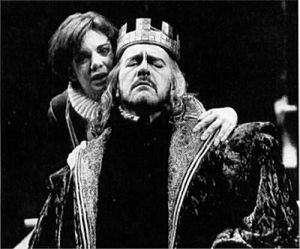King Lear
|
Once generally regarded as unactable, King
Lear has now become almost ubiquitous. After an outstanding intimate
Lear at the Cottesloe, and an eccentric female Lear, we now have
Peter Hall's production at the Old Vic, the culmination of his brilliantly
successful attempt at mounting a genuine repertory season with an excellent
permanent ensemble, an enterprise which, alas, now, it seems, is doomed by the
withdrawal of his Canadian theatre owners and sponsors.
How is the present popularity of this difficult
and dark play to be explained? Do we have more outstanding actors than previous
generations? Hardly. Is the theme of the play more relevant today than
previously? Surely not - conflicts between parents and children have always
been at the forefront of humanity's concerns. |

|
I believe the answer lies largely in the increased
ability of directors to use a fast-moving, truly 'epic' style that relies on
the verse and the strong story-line rather than scenery and spectacular
effects. The capability of modern sound-systems to conjure up a truly
convincing storm also helps.
Thus Richard Eyre's recent production with Ian Holm,
and Peter Hall's here with Alan Howard, have that in common: the story is told
with such verve and efficiency that suspense never falters and the
three-and-a-half hours pass with not the slightest hint of boredom.
Another aspect the two versions share is the concept
of Lear's Fool as an old man: in fact, a kind of burlesque parody of the
senescent king. Alan Dobie who takes the part here adds considerable skills in
juggling and a repertoire of comic gags, which makes him appear as a more
professional clown than Michael Bryant's melancholy figure at the
Cottesloe.
But the main contrast lies in the king himself: if
Ian Holm is a compact little fighting cock of a man, Howard is more heroic,
more the arrogant aristocrat. He speaks the verse, in his mellifluous tenurial
voice with the utmost clarity, bringing out the full impact of the poetry. A
very fine performance - the finer for the fact that having seen him as Vladimir
in Waiting for Godot in the same season adds fascinating
cross-references between these two plays on the vanity of human
existence.
The general level of acting is very high. Peter
Hall's ensemble is a group of real star actors - Denis Quilley's Gloucester
shows this formidable performer at the height of his versatile craft, Greg
Hicks is a brilliant Poor Tom (another cross-reference to his Lucky in Godot)
and heroic in his true persona as Edgar, while Andrew Woodall is an
attractively repulsive bastard brother. David Yelland's Kent is suitably
down-to-earth and loyal. Anna Cartaret (Goneril) and Jenny Quayle (Regan) lend
the wicked daughters pride, ambition and malicious sexiness of the highest
order. In contrast Victoria Hamilton's Cordelia must needs appear somewhat
pallid, simply because she has less to say.
John Gunter's all-purpose set for the whole season -
a blue box - is here most ingeniously modified, with the back wall split open
in ragged lines to create the effect of lightning, and opening wider at times
to show images of landscapes, rather on the lines of Fuchs' famous Reliefbuhne
or Copeau's Theatre de l'Oeuvre, earlier attempts to adapt scenery to
fast-flowing narrative drama.
The text is practically uncut and Peter Hall has
clarified it most effectively - for example by briefly suggesting, through a
mounting cacophony, the battle in which Cordelia is defeated and Lear captured.
There are many such simple and imaginative touches in the production - making
it, among many great ones - one of the clearest and most moving Lears I,
for one, can remember.
Martin Esslin
Plays International, November 1997
